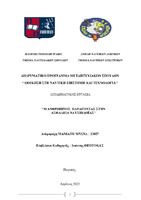| dc.contributor.advisor | Θεοτοκάς, Ιωάννης | |
| dc.contributor.author | Μανιάτη, Ανδρομάχη | |
| dc.date.accessioned | 2025-05-20T13:25:22Z | |
| dc.date.available | 2025-05-20T13:25:22Z | |
| dc.date.issued | 2025-04 | |
| dc.identifier.uri | https://dione.lib.unipi.gr/xmlui/handle/unipi/17773 | |
| dc.description.abstract | Στην σύγχρονη εποχή όπου η εξέλιξη της τεχνολογίας διαδραματίζει πολύ σημαντικό ρόλο σε πολλές πτυχές της καθημερινότητας, η προσαρμογή στις νέες μεθόδους είναι επιτακτική και στον κλάδο της ναυτιλίας. Η διεθνής νομοθεσία / διεθνείς συμβάσεις για την ασφάλεια ναυσιπλοΐας πλέον τροποποιούνται διαρκώς με στόχο την πρόληψη και αποφυγή των ναυτικών ατυχημάτων, λαμβάνοντας υπόψη διαρκώς νέες προκλήσεις. Είναι σαφές ότι, ο ρόλος του ναυτικού χαρακτηρίζεται στις μέρες μας, αρκετά απαιτητικός καθώς οφείλει να είναι εξοικειωμένος με νέα συστήματα και εφαρμογές κατά την εκτέλεση της θαλάσσιας υπηρεσίας του. Ο καθοριστικός ρόλος του Διεθνούς Ναυτιλιακού Οργανισμού (ΙΜΟ), ως αρμόδιος για την λήψη αποφάσεων αναφορικά με την τροποποίηση της διεθνούς νομοθεσίας για την ναυτιλία, επιδιώκει τα αποτελέσματα των Επιτροπών του να λαμβάνουν υπόψη τις νέες τεχνολογίες (πχ στα συστήματα πλοήγησης επί του πλοίου, πλατφόρμες επικοινωνίας μεταξύ πλοίων και με τις Αρχές, αυτόνομα πλοία, εναλλακτικά καύσιμα) με στόχο την προάσπιση των συμφερόντων της ποντοπόρου ναυτιλίας, διατηρώντας στενή συνεργασία με τον Διεθνή Οργανισμό Εργασίας (ΙLO) για ζητήματα βελτίωσης της ασφάλειας και προστασίας των δικαιωμάτων των ναυτικών.
Σημαντικό ρόλο στην βελτίωση της απόδοσης του ανθρώπινου παράγοντα διαδραματίζουν οι δείκτες αξιολόγησης της εν γένει συμπεριφοράς του ανθρωπίνου στοιχείου στη ναυτιλία, με πρωταγωνιστές το πρόγραμμα TMSA και τον δείκτη SIRE 2.0.
Ενώ, βαρύνουσας σημασίας είναι η πρόσφατη καινοτομία των αυτόνομων πλοίων επιφανείας, οποία διαθέτει μεν πολλούς υποστηρικτές, ωστόσο υπάρχουν ισχυρές αντιρρήσεις δε, οποίοι υπογραμμίζουν τον αναντικατάστατο ρόλο του ανθρώπινου στοιχείου. | el |
| dc.format.extent | 78 | el |
| dc.language.iso | el | el |
| dc.publisher | Πανεπιστήμιο Πειραιώς | el |
| dc.rights | Αναφορά Δημιουργού-Μη Εμπορική Χρήση-Όχι Παράγωγα Έργα 3.0 Ελλάδα | * |
| dc.rights.uri | http://creativecommons.org/licenses/by-nc-nd/3.0/gr/ | * |
| dc.title | Ο ανθρώπινος παράγοντας στην ασφάλεια ναυσιπλοϊας | el |
| dc.type | Master Thesis | el |
| dc.contributor.department | Σχολή Ναυτιλίας και Βιομηχανίας. Τμήμα Ναυτιλιακών Σπουδών | el |
| dc.description.abstractEN | Nowadays, where the evolution of technology plays a very important role in many aspects of daily life, adapting to new methods is imperative in the shipping industry as well. International legislation and conventions regarding maritime safety are constantly being amended with the aim of preventing and avoiding maritime accidents, while continuously considering new challenges. It is clear that the role of the seafarer, today, is quite demanding, as they must be familiar with new systems and applications while performing their maritime duties. The decisive role of the International Maritime Organization (IMO), as the main body responsible for decision-making regarding the modification of international maritime law, seeks to ensure that the results of its Committees take into account new technologies (e.g., navigation systems aboard ships, communication platforms between ships and authorities, autonomous vessels, alternative fuels), with the goal of safeguarding the interests of the global maritime industry, while maintaining close cooperation with the International Labour Organization (ILO) on issues related to improving safety and protecting the rights of seafarers.
An important key in improving the performance of the human element is based on the evaluation indicators of the general behavior of the human factor in shipping, with the TMSA program and the SIRE 2.0 index being key players.
Additionally, the recent innovation of autonomous surface vessels, which has many supporters, has also faced strong opposition from those who emphasize the irreplaceable role of the human element. | el |
| dc.corporate.name | Σχολή Ναυτικών Δοκίμων | el |
| dc.contributor.master | ΔΠΜΣ στη Διοίκηση στη Ναυτική Επιστήμη και Τεχνολογία | el |
| dc.subject.keyword | Human element | el |
| dc.subject.keyword | Shipping | el |
| dc.subject.keyword | Safety at sea | el |
| dc.subject.keyword | SIRE 2.0 | el |
| dc.subject.keyword | TMSA | el |
| dc.subject.keyword | MASS | el |
| dc.date.defense | 2025-04-28 | |



